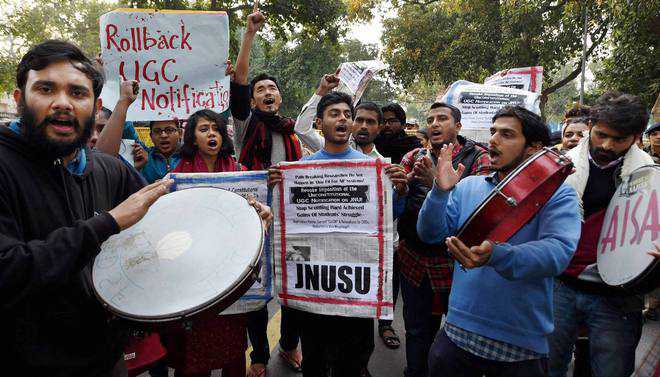
Burning question: Students questioning their teachers, institutions, government and society is part and parcel of the learning process Photo: PTI
M Rajivlochan
History is the art of dealing with memories. For that very reason it is a highly contested craft. Those contestations can make us wiser, if done properly, with enough depth and thick description, without prejudice and the objective to prove political or ideological points. That is the simple message that comes through in this engaging book which invites the reader to look at aspects of history that normal history books do not cover. The text is divided into seven chapters. Between them these talk of culture, heritage, time, scientific method in its cultural context, women, discriminations and the underpinning of knowledge that allows us to relate to the past in a scientific, systematic manner.
It is in the last chapter, where, as part of narrating the early history of the Centre for Historical Studies (CHS) at JNU, which Thapar helped set up, that we come to know of the reason why the CHS got for itself the label ‘Marxist’. Thapar explains that it was because the scholars and students at the centre engaged with the ideas of Marx that many began to presume that they were Marxists. Quite far from that, she tells us. All that was happening was a healthy engagement with diverse ideas through a process that taught students the art of exploring new areas, ask questions and sometimes be a little rebellious.
Students questioning their teachers, institutions, government and society is something that, Thapar says, is part and parcel of learning. If once in a while this results in a strike or a dharna, the powers that be would simply have to learn to live with it. Strike action itself is part of a larger dialogue with which students engage with society and society needs to engage back rather than block off the students.
With great satisfaction, she points out that the content of courses taught at JNU and the method of teaching came to be emulated even by those institutions that were critical of them.Under such circumstances, how should the government respond? Thapar argues that it is best to allow the questionings to continue and engage in a dialogue with those raising questions.The government needs to confine itself to the role of a financier, Thapar points out, and nothing more.
In the absence of such questioning, she suggests, knowledge gets reduced to remembering mantras, the bane of India’s education system.People lose the ability to test reality, cease to understand myths. A desire to acknowledge the scientific researches of one’s ancestors, gets reduced to funny beliefs about the Pushpak Vimana being an aeroplane and the Kauravas being born out of some experiment in stem-cell research.
In an even-handed manner, Thapar lays a part of the blame for such beliefs on the way historians segregated their subjects of research. In the area of ancient Indian history, for example, she says historians forgot to integrate their researches on society, culture, arts and crafts with the science and technology that underlay it. As a result, it became possible for the gullible to imagine extraordinary achievements in science and technology in ancient India which were completely disconnected with reality.
An interesting bit of detail that Thapar shares is about how the CHS continued with the flawed Indian practise of dividing history into three specialisations, ancient, medieval and modern. She acknowledges that the separation was defective but says that the CHS justified it in the name of the requirements of the job market. That does suggest a certain innocence about how the job market in higher education actually functions in India. Seldom does any fresh recruit in a college get the chance to teach courses that are connected to their specialisation. They are more like the chhotus who are supposed to do all odd jobs in the workshop of history, with no regard to their personal likes or abilities.



























